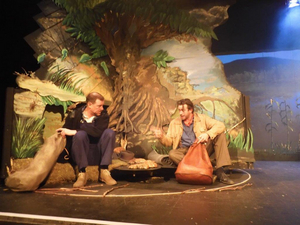 Reviewed by Barry Lenny, Thursday 19th August 2021.
Reviewed by Barry Lenny, Thursday 19th August 2021.
The Therry Dramatic Society is presenting
John Steinbeck's 1936 play,
Of Mice and Men, under the direction of Geoff Brittain. The play is in two acts, each of three scenes, set in the harsh years just before WWII. The company's advertising points out that, of course, attitudes, such as racial discrimination and segregation, reflect those of the time. The 'Black Codes' and 'Jim Crow Laws' continued into the 1960s, until Rosa Parks refused to give up her seat on a bus to a white man, and Martin Luther King began his civil rights movement against discrimination, leading to the signing of the Civil Rights Act in 1964. Even today, pockets of segregation still exist in the USA.
George Milton is of average looks, but quite smart, while his friend, Lennie Small, is of imposing build, but limited mental ability, childlike, and doesn't know his own strength. Together, they roam California during the Great Depression, looking for work. They dream of, someday, having a place of their own. As in Burns's poem, To a Mouse, from which the work's title is derived, the best-laid plans of these two, gang agley.
Fascinated by the material of a woman's dress, while in their previous job, Lennie had innocently touched it, causing her considerable distress, shouting "rape", and sending them on the run from an angry crowd. As the play opens, we find them by the river, after leaving the bus a long distance from the property where they have a job waiting. This is where we get to know them, and of their big plans for the future.
The first act was a little slow, with rather too many commas and full stops becoming pauses, but the second act picked up the pace, possibly following a word from the director. The scene with Lennie and Crooks, in the latter's room, was perhaps the most convincing of the evening. They established a fine rapport between their two characters, both of whom are outsiders, Lennie, for his low intellectual level, and Crooks, who is black.
George Milton is played by Leighton Voigt in a solid performance, finding a balance between a degree of frustration at Lennie's inability to grasp and remember what he is told and to understand how to act appropriately, against his fondness for his friend and desire to protect him from the world.
Stuart Pearce is a standout as Lennie Small, never missing a beat in a superb characterisation. He discovers all of the nuances in the role. Lennie's childish desire to have the story of their plans repeated over and over, his desire for being able to care for small creatures, and his fascination for all things tactile, is beautifully conveyed.
Newcomer to Adelaide, in his first theatrical role, Christian Best is a real find in a most convincing performance as Crooks, and we can only hope that we see much more of him in the future.
Ashley Penny is suitably flighty and seductive as Curley's Wife and, as Slim, Kym Clayton conveys the role of the observant and sympathetic character with finesse. As Curley, Adam Schultz is imposing, but shouting, alone, does not necessarily convey anger effectively.
The other, minor roles are filled effectively by John Rosen, as Carlson, James Fazzalari, as Whit, and Robert Donnarumma, as The Boss.
Philip Lineton tends to extend every vowel, in a caricature performance as Candy.
The set design, by Ole Wiebkin, looks deceptively solid and highly detailed, yet the changes are fast and smooth, and it is well lit by Richard Parkhill. Gilain Cordell and Sandy Faithfull have costumed the production effectively, and Anna Judith Geraldo's puppet dog looks quite realistic.
Disclaimer: Kym Clayton is, like me, a member of the Adelaide Critics Circle.
Reader Reviews
To post a comment, you must
register and
login.

 Reviewed by Barry Lenny, Thursday 19th August 2021.
Reviewed by Barry Lenny, Thursday 19th August 2021.
 Reviewed by Barry Lenny, Thursday 19th August 2021.
Reviewed by Barry Lenny, Thursday 19th August 2021.